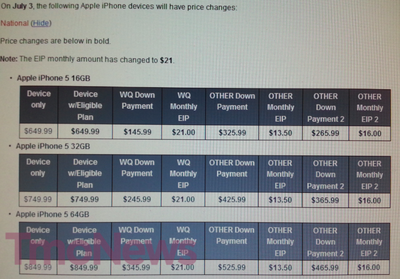When T-Mobile began selling the iPhone back in April, the carrier offered the entry level iPhone 5 for a down payment of just $100 with 24 monthly payments of $20 for a total device cost of $580.
In May, T-Mobile changed the down payment pricing to $150, bringing the total cost of the iPhone to $630, and today Tmonews reports that the carrier adjusted its pricing once again, lowering the down payment price to $145.99 but raising its monthly equipment installment price by $1, effectively making the overall price of the phone $649.99 ($145.99 + $21 x 24). That is essentially the same price that an unsubsidized phone costs directly from Apple.

The decreased down payment brings the initial cost of the 32GB iPhone 5 to $245.99 and the cost of the 64GB iPhone 5 to $345.99. T-Mobile's no contract monthly data plans remain the same, beginning at $50 per month for unlimited talk, text, and data.






















Top Rated Comments
Maybe I don't understand it correctly, maybe my math is wrong, but that's not a $5 difference.
Do you then also believe that AT&T and VZ should have to put their Early Termination Fees in big bold print as well as tell you that your phone plan will never get cheaper even after you have satisfied your contract?
Or you just buy the iPhone directly from Apple and pop in a T-Mobile prepay SIM at $30/mo. (The $30 plans are in the smaller print at the bottom of the page.)
http://prepaid-phones.t-mobile.com/prepaid-plans
Unlike the big three, T-Mobile doesn't require a minimum plan to use an iPhone on their network. You have real choices based on your usage.
You will get billed for the remainder cost of the phone. There's no customer benefit to getting a "discounted" iPhone to just take it to AT&T.
If you're happy, great! However your opinion and choice to spend a premium to show your Verizon brand loyalty does not change the facts that the American "post paid" system and tradition of phone subsidies means much more expensive cell phone service than anywhere else in the world.
The "no contract" thing is a big deal for many reasons and on many levels. It is slightly mitigated because of the aging underlying CDMA backbone for Verizon and Sprint which has allowed for effective segmenting of the markets by the big two (Verizon and AT&T) and was almost made complete by the buy-out of T-Mobile and the collapse of Sprint. One great thing about a "no contract" plan is you stop paying for the phone subsidy once your phone is paid off. Verizon will keep charging that premium rate ad infinitum.
I find the complaints about T-Mobile's lack of transparency hilarious. If you want to appreciate the effects of the cell phone oligopoly look at the pre-paid service rates. In the pre-paid world there is still a healthy amount of competition and the rates are LOWER than post-paid. It used to be the whole point of post-paid was to get a BETTER service rate because you had good credit and IF you signed a contract you got a discount on the phone. Now it is some weird middle-class tax because pre-paid is for teenagers and drug dealers.
I say all this as a Verizon contract signer. It was a mistake that has and will cost me several $1000's of dollars by the time my family contract is up but there weren't these options at launch. If you really, really NEED Verizon or AT&T for coverage then great, pay their premium. If you don't, and you really do plan on sticking with one carrier for 15 years, switch now. You will save money.